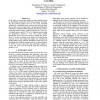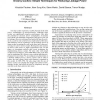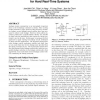312 search results - page 1 / 63 » Architectural approaches to reduce leakage energy in caches |
ISCAS
2002
IEEE
13 years 9 months ago
2002
IEEE
In this paper, we present two methods to reduce leakage energy by dynamically resizing the cache during program execution. The first method monitors the miss rate of the individua...
ICCAD
2003
IEEE
14 years 1 months ago
2003
IEEE
Leakage energy will be the major energy consumer in future deep sub-micron designs. Especially the memory sub-system of future SOCs will be negatively affected by this trend. In o...
ISCA
2002
IEEE
13 years 9 months ago
2002
IEEE
On-chip caches represent a sizable fraction of the total power consumption of microprocessors. Although large caches can significantly improve performance, they have the potential...
CASES
2007
ACM
13 years 8 months ago
2007
ACM
Leakage energy consumption is an increasingly important issue as the technology continues to shrink. Since on-chip caches constitute a major portion of the processor's transi...
CODES
2003
IEEE
13 years 10 months ago
2003
IEEE
The focus of this work is on utilizing the state of objects during their lifespan in optimizing the leakage energy consumed in the data caches when executing embedded Java applica...



